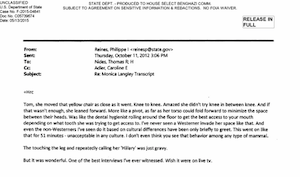WASHINGTON -- The State Department released 551 more emails from the personal server of Hillary Clinton on Saturday, including 84 with some or all of the messages blocked out because they contained information that has now been deemed classified. Three of those are classified "secret."
FULL ELECTION COVERAGE
Each of the secret emails included Clinton's comments atop forwarded chains of messages discussing tensions on the Sinai Peninsula; a visit by John Kerry to Pakistan after Osama bin Laden's death; and back-channel talks between the Israelis and Palestinians.
The State Department has now classified as secret 21 emails from 33,000 that were sent through the private server Clinton used while secretary of state from 2009 to 2013.
An additional 22 emails -- mostly referring to the CIA's drone strikes, officials have said -- have been deemed to be "top secret." Those are considered too sensitive to release to the public even with portions blocked out.
Secret is the highest level of classification the State Department can use; top secret is used by the nation's intelligence agencies for their programs, information or sources of information.
The presence of classified information in the emails has become an issue in Clinton's presidential campaign, as well as the subject of an investigation that the FBI's general counsel, James Baker, acknowledged publicly for the first time last week.
The State Department took the step of releasing more emails on a Saturday in the middle of a holiday weekend because of a court order last week that ensures a steady stream of releases between now and the end of February.
It is expected to be a period of intense campaigning in Clinton's effort to defeat Sen. Bernie Sanders of Vermont for the Democratic presidential nomination -- with caucuses in Nevada and a primary in South Carolina. The final release of emails is scheduled for Feb. 29, the day before voting in several states on Super Tuesday.
Clinton and her aides have said the State Department and the intelligence agencies are overzealously classifying information that was not marked classified at the time. The author of one of the emails marked as "secret" and released Saturday, Dennis Ross, agreed.
Ross, a former official at the State Department and National Security Council, drafted a two-page email to Clinton on Sept. 22, 2012, offering "a few thoughts for your upcoming meetings." Ross had left the government but continued to act as an intermediary in back-channel talks between the Israelis and Palestinians, a role he discussed in a new book, Doomed to Succeed.
Virtually all that followed in the message has been redacted, or blocked out. Clinton replied to the email with a short note: "Thanks, Dennis. Can you talk this morning?"
Although those talks were diplomatically sensitive and were not disclosed, Ross said in an interview that nothing about the discussion should be classified. He added that he had submitted the chapter of his book dealing with the talks for a security review and that it was cleared for publication.
"It shows the arbitrariness of what is now being classified," Ross said.
One of the other emails classified secret included a chain of messages involving the Sinai Peninsula that was copied to a number of administration officials. It included messages written in August 2012 by David Satterfield, a former ambassador who was serving as director general of the international peacekeeping force in the Sinai. At the time, the region faced a growing insurgency after the ouster of Egypt's president, Hosni Mubarak.
The subject line in the final message, which was forwarded to Clinton, read, "Molho on Sinai Tensions," an apparent reference to the senior Israel security adviser, Isaac Molho. The contents have been redacted entirely.
The third "secret" email included a reference to Kerry's wanting to speak to her. It was written during his visit in May 2011, when he was a senator, to Pakistan, where he sought to calm Pakistani anger over the secret raid that killed bin Laden.
In addition to those three, 81 other emails were classified at the lowest level, or "confidential." One of those includes a chain of messages forwarding an article from The Telegraph newspaper in Britain detailing remarks from John Sawers, then the chief of that country's intelligence service, MI6, about efforts to foil Iran's nuclear weapons program.
"Most unfortunate on many levels to say the least," the State Department's chief negotiator on Iran's program, Wendy Sherman, wrote in remarks that were not redacted. Clinton replied to the last forward, "Gobsmacking!"
Information for this article was contributed by Emmarie Huetteman of The New York Times.
A Section on 02/14/2016

